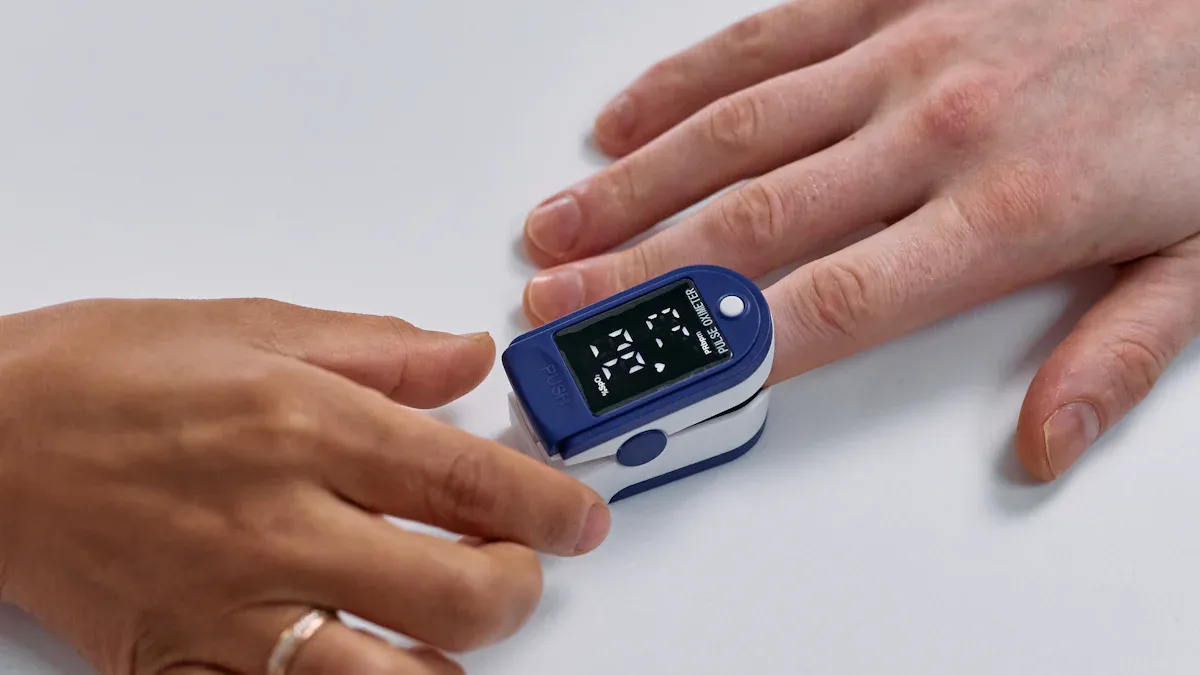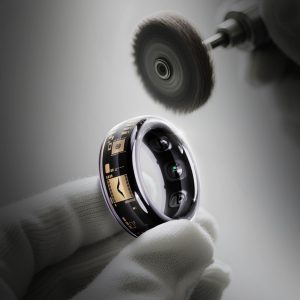
The normal resting heart rate for healthy adults falls between 60 and 100 beats per minute, although most people show a typical resting pulse rate between 55 and 85. Athletes often have a lower normal heart rate, sometimes in the 40s, while children and teens show higher values. Your resting heart rate reflects how efficiently your heart works when you are calm. Keeping a healthy resting heart rate supports your heart and lowers your risk for heart problems. Smart rings, like the VERTU Aura Ring, now let you check your normal resting heart rate and other health data easily every day.
Key Takeaways
-
Most adults have a healthy resting heart rate between 55 and 85 beats per minute. Athletes and children can have different normal ranges.
-
Check your resting heart rate in the morning before you get out of bed. This gives the most accurate reading. You can use your pulse or a smart ring like the VERTU Aura Ring.
-
Regular exercise, eating healthy foods, managing stress, and sleeping well help keep your resting heart rate healthy. These habits also support your heart health.
-
If your resting heart rate is below 50 or above 100 beats per minute and you are not an athlete, pay attention. Talk to a doctor if you notice sudden changes or feel dizzy or have chest pain.
-
Using smart devices to track your heart rate every day helps you see patterns early. This helps you make better health choices and protect your heart over time.
Healthy Resting Heart Rate
What Is It?
A healthy resting heart rate shows how well your heart works when you are calm and not moving. You measure this rate in beats per minute. Most healthy adults have a resting heart rate between 60 and 100 beats per minute. Many experts say that healthy ranges often fall between 55 and 85. Your heart rate can change based on your age, fitness level, and daily habits. If you are an athlete, you may notice a lower normal resting heart rate. Children and teens usually have higher rates.
You can check your resting heart rate by counting your pulse or using smart devices. The VERTU Aura Ring helps you track your healthy resting heart rate every day. This ring uses advanced sensors to give you accurate readings. You see your heart rate patterns and learn what is normal for you. When you know your healthy resting heart rate, you understand your heart’s rhythm and spot changes early.
Tip: Try to measure your resting heart rate in the morning before you get out of bed. This gives you the most accurate result.
Why It Matters
Your healthy resting heart rate tells you a lot about your heart’s health. If your rate stays in the normal range, your heart works well and pumps blood easily. A lower healthy heart rate often means your heart is strong. If your resting heart rate is too high or too low, you may need to pay attention. Changes in your resting heart rate can signal stress, illness, or other health problems.
Knowing your healthy resting heart rate helps you make better choices for your health. You can use smart rings like the Aura Ring to watch your heart rate over time. This helps you see patterns and spot problems early. When you keep your resting heart rate in healthy ranges, you lower your risk for heart disease and other issues.
Here is a simple table to show what different resting heart rate values can mean:
|
Resting Heart Rate (bpm) |
What It Means |
|---|---|
|
40–54 |
Very low, common in athletes |
|
55–85 |
Optimal healthy range |
|
86–100 |
Normal, but watch for changes |
|
Over 100 |
High, may need attention |
You can improve your healthy resting heart rate by staying active, eating well, and managing stress. Tracking your heart rate helps you stay aware and take action when needed.
Measuring Resting Heart Rate

How to Measure
You can measure your resting heart rate in two main ways: by hand or with smart technology. If you want to use the manual method, follow these steps:
-
Sit down and relax for at least five minutes.
-
Place your index and middle fingers on the inside of your wrist, just below the base of your thumb. You can also use the side of your neck.
-
Press lightly until you feel your pulse.
-
Count the number of beats for 30 seconds.
-
Multiply that number by two. This gives you your resting heart rate in beats per minute.
If you want to calculate resting heart rate more easily, you can use a smart wearable like the VERTU Aura Ring. This ring uses advanced sensors to track your heart rate all day and night. You do not need to stop and count. The Aura Ring sends your data to an app, so you can see your heart rate trends and patterns over time.
Tip: Smart rings like the Aura Ring give you accurate and effortless heart rate readings. You can focus on your day while your ring tracks your health in the background.
Best Times to Check
You get the most accurate resting heart rate when your body is calm. The best time to check my heart rate is right after waking up, before you get out of bed. You should avoid checking after exercise, eating, or feeling stressed. These activities can raise your heart rate and give you a false reading.
Try to measure your resting heart rate at the same time each day. This helps you notice changes and spot patterns. Using a smart ring makes it easy to track your heart rate every morning without extra effort.
Normal Resting Heart Rate Ranges
Adults
You may wonder what counts as a normal resting heart rate for adults. Most healthy adults have a normal resting heart rate between 60 and 100 beats per minute. Many experts say that the best range for most people is 55 to 85. If you check your pulse and see numbers in this range, you are likely in a healthy zone. Some people, especially those who exercise often, may see numbers a little lower.
Here is a table to help you understand the normal resting heart rate by age for adults:
|
Age Group |
Normal Resting Heart Rate (bpm) |
|---|---|
|
18–25 years |
60–85 |
|
26–35 years |
60–85 |
|
36–45 years |
61–86 |
|
46–55 years |
62–87 |
|
56–65 years |
63–88 |
|
65+ years |
64–90 |
Note: Your resting heart rate for adults may change as you get older. You may notice a small increase with age.
If your resting heart rate for adults stays above 100 or drops below 50 and you do not exercise a lot, you should talk to a doctor. A normal resting heart rate helps your heart work well and keeps you healthy.
Children and Teens
Children and teens have higher normal resting heart rates than adults. Their hearts beat faster because their bodies grow and change quickly. The resting heart rate for children depends on age. Babies and toddlers have the highest rates, while teens start to show numbers closer to adults.
Here is a quick guide to average resting heart rates for children and teens:
|
Age Range |
Normal Resting Heart Rate (bpm) |
|---|---|
|
Newborn (0–1 mo) |
70–190 |
|
Infant (1–11 mo) |
80–160 |
|
Toddler (1–2 yr) |
80–130 |
|
Preschool (3–5 yr) |
80–120 |
|
School-age (6–11) |
75–118 |
|
Teen (12–15 yr) |
60–100 |
You can see that the normal resting heart rate for children drops as they grow older. Teens often have a typical resting pulse rate close to adults. If you track your child’s heart rate, you can spot changes early and help them stay healthy.
Tip: Use a smart ring like the Aura Ring to track your child’s heart rate trends over time. This makes it easy to see if their numbers stay in healthy ranges.
Athletes
If you play sports or train often, your normal resting heart rate may be lower than most people. Athletes usually have strong hearts that pump blood more efficiently. It is common for athletes to have a normal resting heart rate between 40 and 60 beats per minute. Some elite athletes may even see numbers in the high 30s.
A lower average resting heart rate in athletes shows that their hearts do not need to work as hard. This is a sign of good fitness. If you are an athlete, you should still watch for sudden changes in your normal heart rate. A big jump or drop could mean you need more rest or have a health issue.
Remember: A low normal resting heart rate is healthy for athletes, but you should always pay attention to how you feel. If you feel dizzy, weak, or tired, check with a doctor.
Knowing your normal resting heart rate helps you understand your health. Whether you are an adult, a child, or an athlete, tracking your heart rate gives you important clues about your body. Smart rings like the Aura Ring make it easy to watch your numbers and stay in healthy ranges.
Factors Affecting Resting Heart Rate
Modifiable Factors
You can change many things in your daily life to help control your resting heart rate. Regular exercise helps your heart become stronger and more efficient. When you stay active, your heart does not need to work as hard at rest. Eating a healthy diet with less salt and sugar supports your heart health. Managing stress also plays a big role. When you feel calm, your heart rate often stays lower. Getting enough sleep each night helps your body recover and keeps your heart rate steady.
Other habits matter, too. Smoking and drinking too much alcohol can raise your resting heart rate. If you stop smoking and limit alcohol, you help your heart work better. Staying hydrated and keeping a healthy weight also support a normal heart rate.
Tip: Small changes, like walking each day or practicing deep breathing, can make a big difference for your heart.
Non-Modifiable Factors
Some things that affect your resting heart rate are out of your control. Your age is one example. As you get older, your resting heart rate may rise slightly. Genetics also play a part. If your family members have higher or lower heart rates, you might notice the same pattern. Your gender can influence your heart rate, too. Women often have slightly higher resting heart rates than men.
Temperature and time of day can also cause changes. Your heart rate may be higher when it is hot outside or lower when you sleep.
|
Factor |
Effect on Heart Rate |
|---|---|
|
Age |
May increase with age |
|
Genetics |
Family patterns matter |
|
Gender |
Women often higher |
|
Temperature |
Higher in heat |
Medications and Temporary Changes
Some medicines and short-term changes can affect your resting heart rate. For example, medications used to treat ADHD, like methylphenidate and amphetamine salts, can raise your heart rate. Studies show these drugs can increase your resting heart rate by about 5 to 6 beats per minute. This change is important because even small increases in heart rate can raise your risk for heart problems over time.
Temporary factors also play a role. If you feel stressed, excited, or anxious, your heart rate may go up. Illness, fever, or dehydration can also cause short-term changes. Caffeine and some cold medicines may make your heart beat faster for a few hours.
Note: Always tell your doctor about any new medications or big changes in your heart rate. Using a smart ring like the Aura Ring helps you notice these changes early and keep track of your heart health.
When to Seek Help
Dangerous Ranges
You should know when your resting heart rate falls outside the safe zone. Most healthy adults have a resting heart rate between 55 and 100 beats per minute. If your heart rate drops below 50 bpm and you are not an athlete, or if it rises above 100 bpm while you are at rest, you may need to talk to a doctor. These numbers can signal a problem with your heart or another health issue.
Here is a quick guide to help you spot dangerous ranges:
|
Resting Heart Rate (bpm) |
What to Do |
|---|---|
|
Below 50 (not an athlete) |
Seek medical advice |
|
50–100 |
Usually safe |
|
Over 100 |
Seek medical advice |
Note: If you see sudden changes in your heart rate, pay close attention. A big jump or drop can mean your body needs help.
Smart rings like the VERTU Aura Ring can track your heart rate all day. You get alerts if your numbers move into a risky range. This helps you act quickly and stay safe.
Warning Signs
Sometimes, your body gives you clues that your heart needs attention. Watch for these warning signs:
-
You feel dizzy or lightheaded.
-
You have chest pain or tightness.
-
You feel short of breath.
-
You faint or almost faint.
-
Your heart feels like it skips beats or races for no reason.
If you notice any of these symptoms, do not wait. Call your doctor or seek help right away.
Tip: Use your Aura Ring to spot patterns in your heart rate. If you see unusual changes or feel unwell, share your data with your healthcare provider. Early action can protect your heart and your health.
Maintaining a Healthy Heart Rate

Lifestyle Tips
You can take simple steps to keep your heart strong and your healthy heart rate in the normal range. Start with regular exercise. Walking, biking, or swimming helps your heart work better. Try to move your body for at least 30 minutes most days. Eat more fruits, vegetables, and whole grains. These foods give your heart the nutrients it needs. Drink plenty of water and avoid too much salt or sugar.
Stress can make your heart beat faster. Practice deep breathing or try meditation to help you relax. Get enough sleep each night. Most people need 7 to 9 hours. If you smoke, quitting helps your heart right away. Limit how much alcohol you drink.
Tip: If you want to know how to lower resting heart rate, start by making small changes in your daily habits. Even a little progress can make a big difference.
Here is a quick checklist to help you remember:
-
Move your body every day
-
Eat heart-healthy foods
-
Manage stress
-
Sleep well
-
Avoid smoking and limit alcohol
Tracking Progress
You can track your progress and see how your habits affect your heart. Use a smart ring like the VERTU Aura Ring to check your heart rate each day. The ring shows your numbers and helps you spot patterns. You can see if your heart rate stays in the normal range or if it changes over time.
Write down your heart rate in a notebook or use the Aura app. Look for trends. If you notice your heart rate going up or down, think about what changed in your routine. Share your results with your doctor if you have questions.
Note: Tracking your heart rate helps you stay aware of your health. You can make better choices and keep your heart strong.
Knowing your normal resting heart rate helps you protect your heart. When you track your heart rate with smart rings, you spot changes early and stay informed. Regular monitoring links to better heart health and lower risk of heart problems.
-
Higher resting heart rates can signal a greater risk for heart disease or stroke.
-
Lower or improving heart rates often show better fitness and health.
If you notice unusual patterns or symptoms, talk to your doctor. Take charge of your heart health and make positive choices every day. 🫀
FAQ
What is a resting heart rate?
Your resting heart rate shows how many times your heart beats each minute when you are calm and not moving. You can use a smart ring or count your pulse to find this number.
How often should you check your resting heart rate?
You should check your resting heart rate once a day, usually in the morning before you get out of bed. This helps you see your normal pattern and spot changes early.
Can smart rings like the VERTU Aura Ring track heart rate all day?
Yes, the VERTU Aura Ring tracks your heart rate 24/7. You get real-time data and weekly reports. The ring helps you notice changes and understand your heart health.
What should you do if your resting heart rate is too high or too low?
If your resting heart rate goes above 100 or below 50 and you do not exercise a lot, you should talk to your doctor. Watch for symptoms like dizziness or chest pain.







